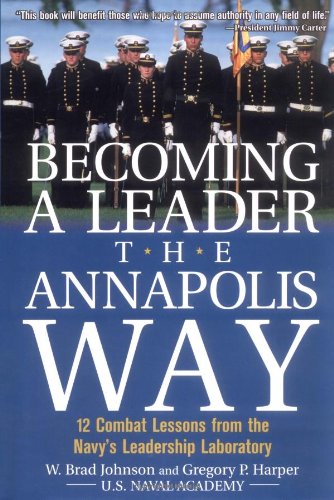
Becoming a Leader the Annapolis Way
12 Combat Lessons from the Navy's Leadership Laboratory
کتاب های مرتبط
- اطلاعات
- نقد و بررسی
- دیدگاه کاربران
نقد و بررسی

August 23, 2004
The military takes leadership very seriously, and this stolid but readable primer offers an unusually coherent view of the subject. Harper, a USNA alum, and Johnson, a psychologist and USNA Leadership professor, discuss such time-honored leadership topics as delegating, vision and servant-leadership, but their focus remains on the distinctive leadership approach preferred at the Annapolis Naval Academy. The hazing, constant drill and crushing workload at Annapolis, they feel, prepare students for the stress of combat command while inculcating obedience, teamwork and unit solidarity. Upperclassmen learn to take progressively greater responsibility for the performance of their comrades. Throughout, students are steeped in devotion to the Navy's storied past and uncompromising code of honor. The authors argue that this regimen tends to produce paragons of integrity, grace under pressure, emotional sensitivity and deep regard for the welfare of subordinates. Harper recounts lots of leadership incidents from his years of command, while Johnson gives the material a psychotherapeutic gloss. They include reminiscences from Jimmy Carter, John McCain and other illustrious USNA grads, along with many stories of heroic (and less than heroic) military leaders. Their account of USNA leadership doctrine and praxis is lucid and engaging, if slightly idealized and stentorian, but it is not clear that it translates well, as they contend, into the civilian economy. The average Taco Bell, for instance, lacks the institutional mystique, compelling purpose and total control over employees' lives that the military enjoys; unlike the Naval Academy, it can't afford to let incessant drill, leadership exercises and sado-masochistic bonding rituals take time away from selling burritos. The book offers an illuminating look at the ideological foundations of military life, but does not seem a cure-all for the ills of the business world.

September 6, 2004
The military takes leadership very seriously, and this stolid but readable primer offers an unusually coherent view of the subject. Harper, a USNA alum, and Johnson, a psychologist and USNA Leadership professor, discuss such time-honored leadership topics as delegating, vision and servant-leadership, but their focus remains on the distinctive leadership approach preferred at the Annapolis Naval Academy. The hazing, constant drill and crushing workload at Annapolis, they feel, prepare students for the stress of combat command while inculcating obedience, teamwork and unit solidarity. Upperclassmen learn to take progressively greater responsibility for the performance of their comrades. Throughout, students are steeped in devotion to the Navy's storied past and uncompromising code of honor. The authors argue that this regimen tends to produce paragons of integrity, grace under pressure, emotional sensitivity and deep regard for the welfare of subordinates. Harper recounts lots of leadership incidents from his years of command, while Johnson gives the material a psychotherapeutic gloss. They include reminiscences from Jimmy Carter, John McCain and other illustrious USNA grads, along with many stories of heroic (and less than heroic) military leaders. Their account of USNA leadership doctrine and praxis is lucid and engaging, if slightly idealized and stentorian, but it is not clear that it translates well, as they contend, into the civilian economy. The average Taco Bell, for instance, lacks the institutional mystique, compelling purpose and total control over employees' lives that the military enjoys; unlike the Naval Academy, it can't afford to let incessant drill, leadership exercises and sado-masochistic bonding rituals take time away from selling burritos. The book offers an illuminating look at the ideological foundations of military life, but does not seem a cure-all for the ills of the business world.
Copyright 2004 Library Journal, LLC Used with permission.

























دیدگاه کاربران